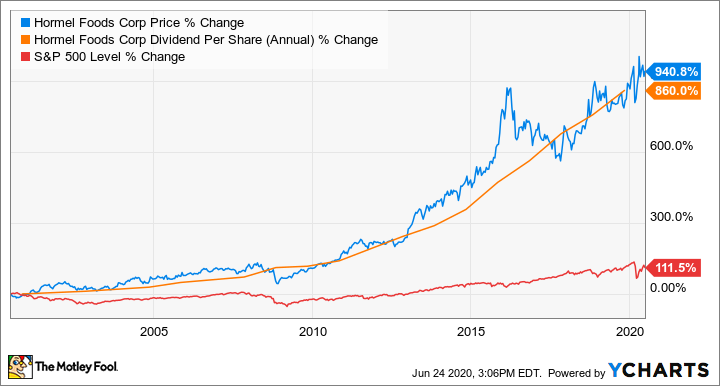Wall Street might decide to ignore companies with a significant number of insiders holding stock, but that doesn't mean private investors should do the same. In fact, investors in dividend aristocrat Hormel Foods (HRL -1.37%), gardening and marijuana play Scotts Miracle-Gro (SMG 3.38%), and pest control company Rollins (ROL 0.34%)are all enjoying positive returns on a year-to-date basis. Let's take a look at what makes all three attractive stocks for investors.

Image source: Getty Images.
Hormel Foods
Hormel Foods actively promotes the fact that 48% of its stock is held by the Hormel Foundation. According to the company, the foundation's aim is to preserve the independence of the company, support its local community, and provide for the financial welfare of its heirs.
As such, Hormel tends to be conservatively run with very little debt. It supports a progressive dividend policy that has resulted in 53 years of consecutively rising dividends. As you can see below, its returns over the last couple of decades have been spectacular.
Data by YCharts
Hormel is essentially a play on long-term growth in the demand for protein. Pork products (including SPAM and bacon) make up slightly more than half of its net sales, with turkey products around 20%, beef around 9%, and nonmeat around 17%.
Hormel faces some near-term headwinds from the COVID-19 pandemic negatively impacting its food service sales (around 30% of its revenue), but this will be offset by increased demand for its retail (just over half of its revenue) and deli (around 10%) sales.
In addition, management aims to boost future revenue growth with a combination of recently acquired business -- the company has spent $1.4 billion on acquisitions in the last three years -- and nearly $700 million worth of capital spending in growth initiatives.
Given the company's track record, it's hard to bet against a successful outcome for its investments. The COVID-19 pandemic may well create some acquisition opportunities for the company. Trading at 26 times forward earnings, Hormel isn't the cheapest stock out there, but income-seeking investors will appreciate the reliability of its dividend.
Data by YCharts
Scotts Miracle-Gro
It's been an interesting year for Scotts Miracle-Gro, a company 28% owned by insiders.Very few companies have been net beneficiaries of the COVID-19 pandemic, but Scotts is one of them. Faced with extended periods of social isolation, some consumers have turned to gardening -- and, in some cases, growing pot.
That's good news for Scotts, which saw sales rise 18% year over year in the first six months of fiscal 2020. Its core U.S. Consumer segment sales (lawns and gardens) were up 11% in this period. Its other segment, Hawthorne, which makes hydroponic supplies often used in growing marijuana, rose a whopping 51% in the same period.

Image source: Getty Images.
The strong sales growth led to a significant hike in full-year guidance. Management expects earnings per share of $5.65-$5.85 compared to a previous estimate of $4.95 to $5.15. As often happens in these situations, the market merrily sold off the stock after the upgrade. Buy on the rumor and sell on the news, and all that.
The question now turns to how sustainable the interest in gardening or marijuana cultivation is and whether it will continue in the coming years. That remains to be seen, but investors should take note that Scotts has a potential long-term growth opportunity should more states legalize marijuana for recreational use. As such, it deserves a close look by investors interested in investing in marijuana.
Rollins
The pest and termite control company is 57%-owned by insiders, including the sons of co-founder Orville Rollins. Randall and Gary Rollins serve as the chairman and chief executive officer of Rollins, respectively. As such, the company's strategy is closely aligned with the interests of its owners. The strategy has worked. Alongside exceptional stock price appreciation, investors have enjoyed a dividend that's increased by a least 12% a year for the last 17 years.
The chart below shows how the company has outperformed its peers over the long term.
Data by YCharts
Rollins' acquisitions and investments in geographic expansion over the years have made it the largest pest and termite control company in the world. The confidence of having 80% of its revenues come from recurring sources undergirds this growth strategy. In addition, commercial and residential pest and termite control is not really an activity that most people consider elective. As such, the company could be seen as a defensive growth stock, which goes a long way toward explaining its price-to-earnings valuation.
Data by YCharts
Rollins certainly isn't a cheap stock, but private investors who want to share in the fortunes of the owners might find it's worth looking into.









